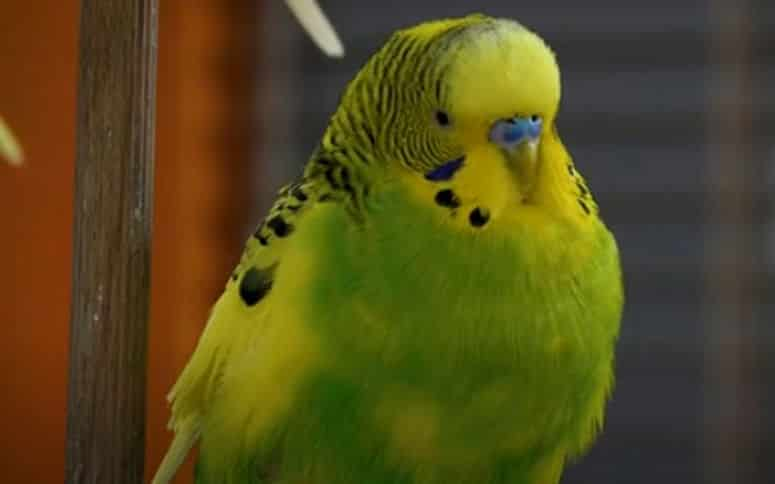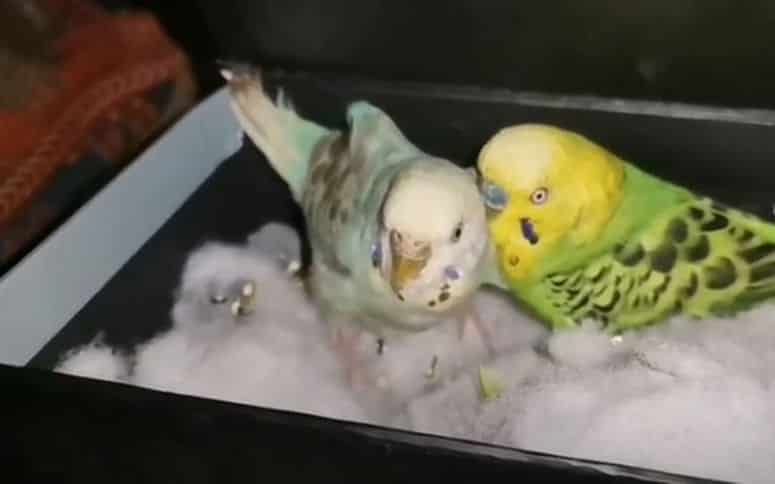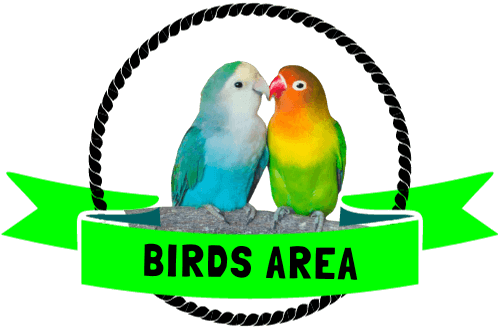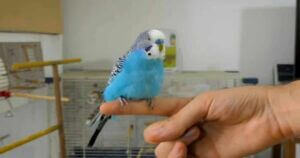Do Budgies Get Cold at Night?
Many bird enthusiasts wonder, ‘Do Budgies Get Cold at Night?’ Understanding your pet’s needs is crucial. Let’s explore the topic.
Yes, Budgies can get cold at night, so it’s vital to ensure they have a warm, cozy environment. Providing a comfortable living space for our feathered friends is crucial to their health and well-being.
However, in this article, I discuss the potential effects of cold on budgies and how to create a warm and secure habitat that will keep them snug during chilly nights.
Do Budgies Get Cold At Night?

Yes, budgies (or parakeets) can get cold at night, especially if the ambient temperature drops significantly.
In their natural habitat in Australia, budgies experience temperature fluctuations, so they have some adaptability to cooler temperatures.
However, captive budgies are more accustomed to consistent temperatures, making them more susceptible to sudden cold spells.
How Do I Know If My Budgie Is Feeling Cold?

Understanding your budgie’s needs is crucial to keeping them happy and healthy. One important aspect to consider is their comfort at night, especially regarding temperature. Budgies, like other birds, are warm-blooded creatures that can feel the cold.
So, how do you know if your budgie is feeling cold? Here are some signs to look out for:
- Puffed feathers: Budgies fluff up their feathers to conserve body heat. If you notice your budgie’s feathers are constantly puffed up, it may indicate that they are feeling cold.
- Shivering: Just like humans, budgies can shiver when they are cold. Observe your budgie’s body movements for any trembling or shaking.
- Decreased activity: Cold temperatures can make budgies sluggish and less active. If your budgie seems unusually lethargic, it might be a sign that they are feeling cold.
- Seeking warmth: Budgies may try to find warmer spots in their cage or huddle closer to their perch when cold. Keep an eye out for these behaviors.
Remember, budgies have different temperature preferences, so what feels cold to one budgie might be tolerable for another.
So, it’s essential to pay attention to your individual budgie’s behavior and adjust their environment accordingly to ensure their comfort and well-being.
What Should I Do If My Budgie Catches A Cold?

If your budgie catches a cold, providing a warm and draft-free environment is vital. Make sure the bird is getting plenty of rest, fresh water, and a balanced diet to support its immune system.
When your budgie catches a cold, taking prompt and appropriate action is crucial to ensure their well-being.
Here are some steps you can take to help your budgie recover from a cold:
- Isolate the budgie: If you have multiple budgies, it is vital to separate the sick budgie from the others to prevent the spread of the illness.
- Keep them warm: Ensure your budgie’s environment is warm and comfortable, as low temperatures can worsen their condition. Place their cage away from drafts and provide extra bedding or a cosy blanket.
- Increase humidity: Dry air can aggravate respiratory symptoms in budgies. Use a humidifier or place a shallow water dish near their cage to add moisture to the air.
- Consult a veterinarian: A professional assessment and appropriate treatment are essential for your budgie’s recovery. Consult a specialized avian vet who can provide appropriate medication or advice.
- Encourage hydration: Ensure your budgie can access fresh, clean water to keep them hydrated. Adding a small amount of honey to their water can sometimes stimulate their drinking.
- Provide a nutritious diet: A well-balanced diet is crucial for your budgie’s recovery. Offer them soft, easy-to-eat foods such as cooked vegetables and fruits to support their immune system.
- Offer warmth during the night: Budgies are more susceptible to cold at night. To help maintain their body temperature, you can use a safe heat source, such as a heat lamp or a heating pad placed under part of their cage.
- Observe behaviour changes: Monitor your budgie closely for any changes in behaviour, appetite, or breathing. If you notice any worsening symptoms or if the illness persists, seek professional help immediately.
By following these steps and providing proper care, you can help your budgie recover from a cold and prevent further complications.
Always remember to prioritize your budgie’s health and well-being, ensuring they have a warm and nurturing environment.
How Do You Treat A Budgie Cold At Home?

Treating a budgie with a cold at home can be challenging, and it’s important to remember that budgies are delicate birds.
If you suspect your budgie has a cold or respiratory infection, it’s crucial to consult with an avian veterinarian for a proper diagnosis and treatment plan.
However, here are some general steps you can take to help care for a sick budgie at home while waiting for veterinary guidance:
- Isolation: To prevent the potential spread of illness, keep the sick budgie in a separate, warm, and quiet environment away from other birds.
- Maintain a stable temperature: Ensure that the room where your budgie is housed maintains a stable temperature between 75°F and 80°F (24°C to 27°C). Proper warmth is essential to help the budgie recover.
- Encourage rest: Ensure that the budgie has plenty of rest and quiet. Reduce disturbances and handle the bird as little as possible to minimize stress.
- Proper nutrition: Offer your budgie a well-balanced diet, including regular food and fresh, high-quality vegetables. You can also provide supplemental nutrition through mashed, wet food to ensure they are well-hydrated. Make sure fresh water is available at all times.
- Grooming: Keep the area around the budgie’s nostrils clean by gently wiping with a soft, damp cloth to remove any discharge.
- Steam therapy: Some owners find that gentle exposure to steam can help clear a budgie’s respiratory passages. You can take your budgie into a bathroom with a hot shower running or use a portable humidifier temporarily. Ensure the budgies don’t get too hot, and don’t place them directly under the hot water or steam.
- Monitor for worsening symptoms: Keep a close eye on your budgie’s condition. If you notice any worsening of symptoms, such as severe difficulty breathing, loss of appetite, or lethargy, contact an avian veterinarian immediately.
- Avoid self-medicating: It’s essential to consult with an avian veterinarian before attempting any home remedies or giving over-the-counter medications to your budgie. Medicating a budgie without professional guidance can be risky.
How Can I Prevent My Budgie From Getting Cold?
Just like humans, budgies can feel the chill during colder nights. However, it is vital to ensure their well-being by preventing them from getting cold.
Here are some ways you can keep your budgie warm at night:
Providing Adequate Bedding
Supply your budgie’s cage with a cozy bedding material, such as shredded paper or soft fabric. Moreover, this will provide insulation and keep them warm during the night.
Enclosing The Cage
Covering the cage with a thin blanket or cage cover can create a warmer environment for your feathered friend. In addition, it helps to retain heat and block drafts, creating a safe and snug space for your budgie to sleep.
Temperature Regulation
Maintain a comfortable temperature in the room where your budgie’s cage is placed. Budgies prefer temperatures between 65-75°F (18-24°C), so ensure the room is not too hot or too cold for them.
Avoiding Cold Drafts
Place the budgie’s cage away from windows, doors, or any area with cold drafts. However, this will prevent cold air from directly reaching your budgie and causing discomfort.
Supplementary Heat Source
Consider using a safe and recommended heat source, such as a heat lamp or ceramic heat emitter, to provide extra warmth during colder nights.
Make sure to position it outside the cage to avoid any accidents, and monitor the temperature regularly.
By following these guidelines, you can ensure that your budgie stays cosy and comfortable throughout the night, minimizing the risks of them getting cold.
Remember, a warm and secure environment contributes to the well-being of your feathered companion, ensuring their happiness and health.
How Do Your Budgies Sleep On Cold Nights
Budgies typically fluff up their feathers to trap warm air and perch closely together at night to conserve body heat during cold nights. To learn more, watch the video “Budgie Sleeping Habits in Cold Weather.
Frequently Asked Questions Of Do Budgies Get Cold At Night?
Can budgies tolerate cooler temperatures at night?
Can budgies get sick from the cold?
Can I use a space heater to keep my budgie warm?
What should I do if my budgie seems cold and unwell at night?
Wrap Up
To ensure the well-being of your budgies, it is essential to understand their heat requirements at night.
By providing a warm and draft-free environment, you can protect your feathered friends from potential health issues caused by cold temperatures. Sufficient insulation, such as cozy bedding or a heated perch, can help keep your budgies comfortable during colder nights.
Remember to maintain a consistent room temperature and monitor their behaviour closely for any signs of discomfort. By prioritizing their warmth, you can ensure a happy and healthy budgie.







